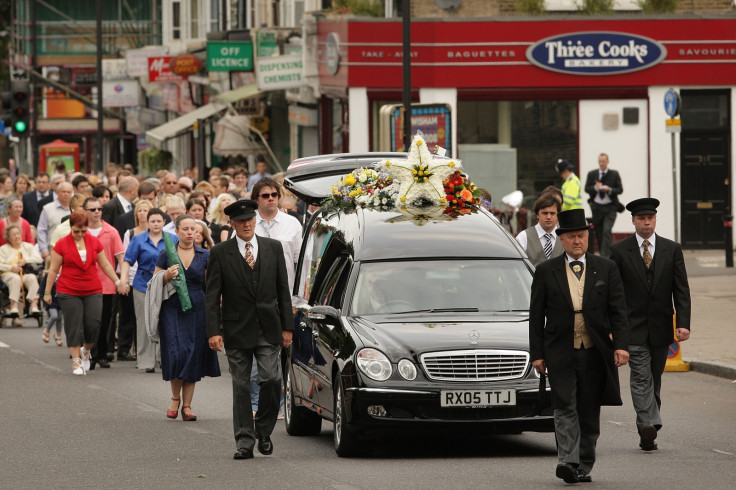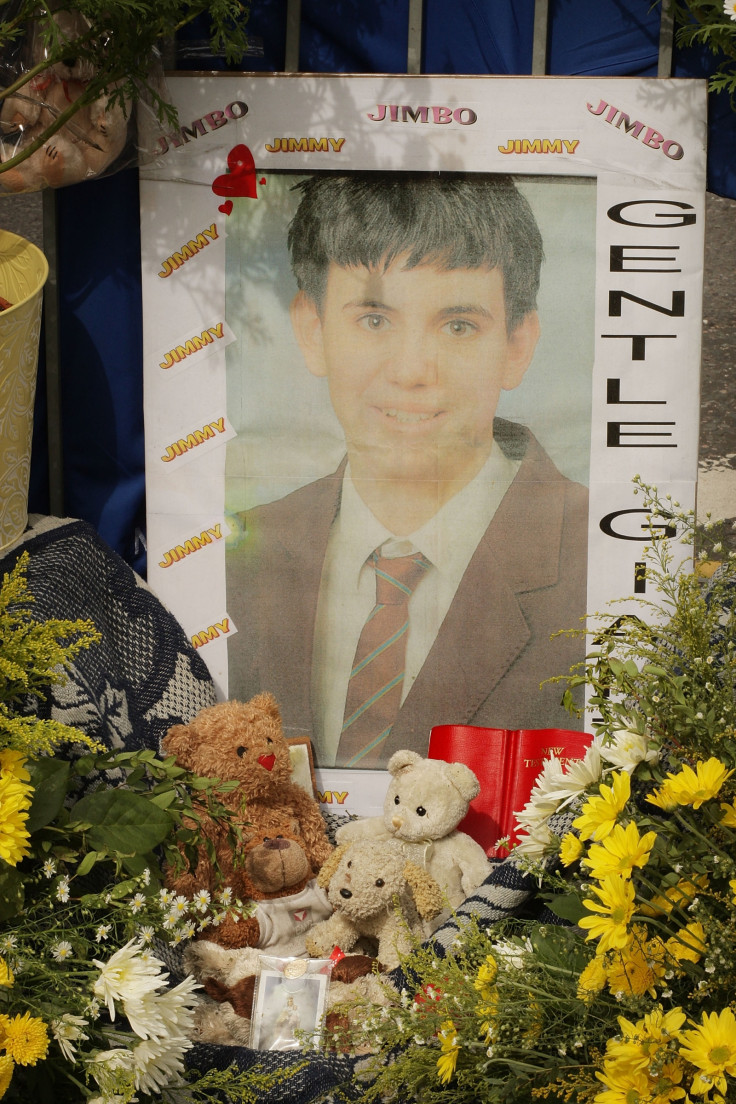'Prison will not save our children from violence' says dad of murdered British teenager
Barry Mizen does not think longer sentences for knife possession will stop crime.

When 16-year-old Jimmy Mizen was murdered in May 2008 his parents' minds were not on retribution. Instead, speaking to the media after her son was killed in a bakery close to their south London home, Margaret Mizen called for the family of his murderer, Jake Farhi, to be left alone.
"They haven't got wonderful memories for their son. All they can think about is the evil he's done. My prayers are with the family, that's all I can say. I can't, I don't feel anger," she said.

Jimmy Mizen was outside the Three Cooks Bakery in Lee when Farhi, who had a string of convictions for violence, challenged him to a fight. Jimmy refused but Farhi followed him inside, first attacking him with an advertising hoarding and then throwing a glass plate in his face, which smashed and severed his neck.
Jimmy bled to death in his older brother's arms. It was the day after his 16th birthday. In May 2009, Farhi was sentenced to 14 years for his murder.
Jimmy was the 13<sup>th teenager to be killed in London in the first six months of 2008 – and by the end of the year the number of young people murdered in the capital had risen to 21, including six stabbed to death in just 24 hours in July. In June 2008, Gordon Brown told the British parliament that anyone caught using a knife in Britain should go to prison and a year later the minimum sentence for murder with a weapon was raised to 25 years.
But over the past eight years, youth violence has not gone away – despite knife crime falling every year between 2010 and 2014 and only rising slightly in 2015. A spate of gang fights, including one in Bexley in September 2016 that was said to involve up to 100 people, has brought the issue into sharp focus. Statistics suggest that gang violence in London has risen more than 23%.
New figures revealed on 6 October showed that police had recorded 29,000 crimes involving knives in the 12 months to March 2016, an increase of 10% on the previous year. The statistics prompted the Sentencing Council for England and Wales to propose raising sentences for knife possession once again, after 1,400 young offenders were sentenced for knife-related crimes in 2015.
Barry and Margaret Mizen have spent the last eight years building their charity, For Jimmy, which works to make London's streets safer for young people. As well as working with Southwark Council to develop so-called 'Safe Haven' zones for young people in Lewisham, the couple visit schools across the UK to help educate children about the risks of youth violence. In 2014, Barry and Margaret were awarded an MBE for their work.
Speaking to IBTimes UK from the charity's offices in Lee, Barry Mizen acknowledges that the London of 2016 has many of the problems it had in 2008 when Jimmy was killed. Even within a square block of where we sat, there have been at least two murders since his son's death. His other son, George, was mugged on the street where Jimmy was killed. In 2016, many young people are still afraid to leave their homes.
"I'd even say that we are becoming more confrontational and aggressive. There has always been confrontation between young boys or whatever but [...] the propensity for violence now it is almost as if you have a right to kill someone. You're perfectly within your rights because they might have insulted you or something," he said.
"There is a strange mindset now which is permeating and I think we probably wouldn't take a lot of notice if people weren't dying. If it was just fights. But this is serious stuff. Within the last ten years something in the region of 180 young people have been killed by young people in London."
If Jimmy's killer was being hung today, it wouldn't make me feel any better. I feel sick at the thought of it.
But despite this, Mizen finds the renewed focus on increasing sentences for knife crimes frustrating. When Jimmy died, Barry and Margaret may have surprised many in Britain by responding with empathy rather than anger – eight years on, Barry urges politicians and the public not to respond to youth crime by increasing sentences.
"There is the belief that locking them up for longer will solve it: it hasn't. It's not a deterrent. When I am thinking rationally and logically I am not going to drive at 60mph because I'll get a speeding fine. I understand consequences. But when you're not thinking rationally and logically because you're young, you're hot headed, you're lashing out – you're not thinking," he said.
As part of their work with For Jimmy, Mizen has visited a number of young murderers in prisons across the UK. As a result he has had an insight into not just the impact that prison itself has on young offenders but how the act of murder affects a young person on a personal level.
"Jimmy's killer will come out one day [and] what are people going to say to him? He might meet a girl who will ask: 'What were you like?'. 'Well, I murdered a schoolboy'. Or say your son is 16-years-old and he says: 'Dad what did you do? And he has to say: 'Well I murdered someone who was your age,'" Mizen said.
That is the message that Barry and Margaret take to schools in the UK – that if you carry a knife and one day, in an explosion of rage, use it to take a life – the consequences last a lifetime. "We will specifically say that this is anger that led to my son's death. Someone got extremely angry without a thought for the consequences," he said.
There are kids walking the streets today who won't be there a year from now. That has to change.
Mizen said that himself and Margaret's empathy in the immediate wake of Jimmy's death "came naturally" and what has driven them since is a refusal to allow such a horrific event destroy their family – to resist the natural desire for revenge.
"All the great films – Gladiator, Godfather – they are all about revenge. But in real life, if Jimmy's killer was being hung today, it wouldn't make me feel any better. I feel sick at the thought of it," said Mizen.
His hope is that both politicians and the public can get away from the knee-jerk reaction of mandatory minimum sentences and retributive justice that has defined Britain's response to youth crime since his son's death. He believes that many politicians in the UK have progressive ideas about how to stem crime without locking young people up for longer, but they are afraid to go against the grain.

"They say to me: 'Barry, I can totally see where you're coming from but I can't say that. I want to get elected next time.' You've got an opposition who says: 'Well, it's all your fault' and then there is a change of government and they say: 'Well, it's all your fault.'
"Straight away you have confrontation – you do not have sensible debate. If we could stop this by increasing punishment, we would have solved crime 2,000 years ago."
Mizen regularly stresses that he is not against prison – actions have consequences – and he readily admits that he doesn't have all the answers to solving youth crime without chucking young criminals in jail and throwing away the key. But equally it is plain that the current system is not working: young people are still killing each other – so why not give education, engagement - and, yes, empathy - a try?
"I would agree that we are becoming a harsher, crueller world – so when is it going to change? I've been called dizzyingly optimistic, I can deal with that. There are kids walking the streets today who won't be there a year from now. That has to change," said Mizen.
Mizen has hope. He tells the story of how, on the day Jimmy was killed, he answered the door to his home in Lee and found a man standing on his doorstep. He recognised him as the owner of a dry cleaning business on the high street, a father himself, who knew some of the Mizen boys from the neighbourhood. The two men didn't speak, they just held each other. Two dads, sharing their grief.
"Common humanity," Mizen said, recalling that day, "that's how we help each other. That's what drives us."
Find out more about Margaret and Barry Mizen's work at forjimmy.org
© Copyright IBTimes 2025. All rights reserved.






















